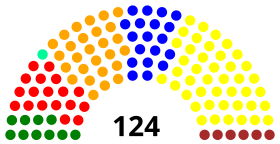Council of Flanders
Flemish Parliament
|
|||||
|---|---|---|---|---|---|
| Type | |||||
| Type | |||||
| Leadership | |||||
|
Group leaders
- majority |
|||||
|
|
|||||
|
|
|||||
|
- opposition
|
|||||
|
|
|||||
|
|
|||||
| Structure | |||||
| Seats |
124 118 from the Flemish Region 6 from the Brussels Region |
||||
 |
|||||
|
Political groups
|
Government (89) Opposition (35)
|
||||
|
Length of term
|
5 years | ||||
| Elections | |||||
| Open list proportional representation (using D'Hondt method) within six constituencies, with 5% constituency election threshold | |||||
|
Last election
|
25 May 2014 | ||||
|
Next election
|
2019 | ||||
| Meeting place | |||||
 |
|||||
| Koepelzaal, Flemish Parliament building, Brussels | |||||
| Website | |||||
| http://www.vlaamsparlement.be/ | |||||
Government (89)
Opposition (35)
The Flemish Parliament (Dutch: ![]() Vlaams Parlement , and formerly called Flemish Council or Vlaamse Raad) constitutes the legislative power in Flanders, for matters which fall within the competence of Flanders, both as a geographic region and a cultural community of Belgium (unlike the French-speaking community and Wallonia, which each have separate legislatures - the Parliament of the French Community and the Walloon Parliament).
Vlaams Parlement , and formerly called Flemish Council or Vlaamse Raad) constitutes the legislative power in Flanders, for matters which fall within the competence of Flanders, both as a geographic region and a cultural community of Belgium (unlike the French-speaking community and Wallonia, which each have separate legislatures - the Parliament of the French Community and the Walloon Parliament).
The Flemish Parliament approves decrees, which are Flemish laws, applicable to all persons in the Flemish Region, and to Flemish institutions in Brussels; it appoints and supervises the Flemish Government; and it approves the Flemish budget. The Flemish Parliament meets in the Flemish Parliament building in central Brussels, and its members and staff are housed in the House of the Flemish Representatives.
From 1830 until 1970 Belgium was a unitary state with a single government and a bicameral national parliament. The laws issued by Parliament applied to all Belgians, and government ministers exercised their authority across the length and breadth of the country. Between 1970 and 2001 the Belgian Parliament approved five successive constitutional reforms. Slowly they changed Belgium from a unitary into a federal state. Part of this was to give the communities and later the regions, their own parliaments.
...
Wikipedia
